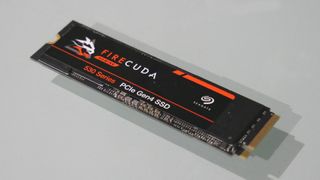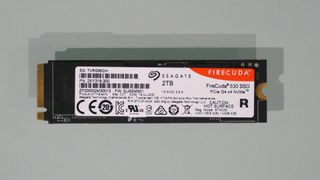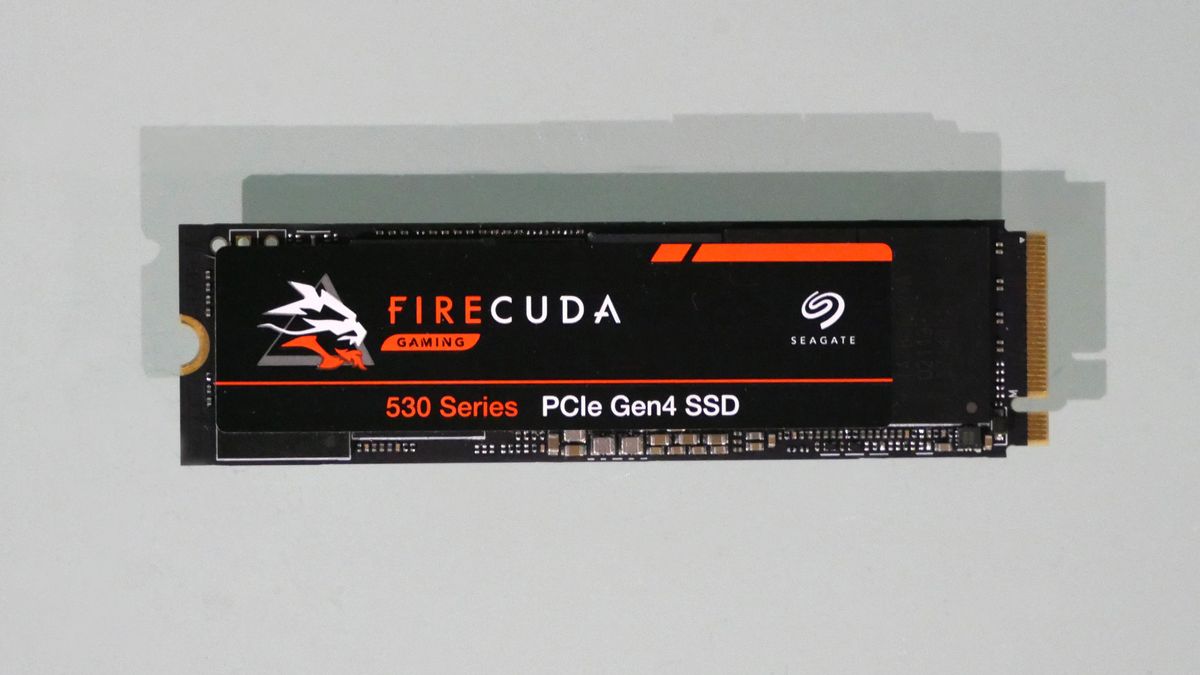12DOVE Verdict
Stellar all-round performance, but inevitably pretty pricey
Pros
- +
Super all-round performance
- +
PS5 compatible
- +
Epic endurance
Cons
- -
Good rather than great 4K throughput
- -
Predictably pricey
Why you can trust 12DOVE
A big name in conventional hard drives, Seagate hasn’t been nearly so visible in the best SSDs for gaming, especially for home PCs, gaming rigs, and now consoles. That changes with the Seagate Firecuda 530. This thing smokes.
With that in mind, you won’t be surprised to hear that it’s a full-feature PCIe Gen 4 drive, complete with 7GB/s-plus of bandwidth, an optional heatsink designed to be compatible with the Sony PS5 console, and five year’s worth of warranty cover. On paper, this drive is very much up there with the big boys of high-performance storage.
Design & Features
Given Seagate’s extensive track record in the storage industry, you might expect it to do all its own homework. But not for the Seagate Firecuda 530 SSD. In fact, it uses the off-the-shelf controller chipset du jour, none other than the Phison E18, albeit "validated" by Seagate for this application.
It’s a controller chip we’ve seen in numerous other high-performance PCIe 4.0 drives, for instance, the Sabrent Rocket 4 Plus, the PNY XLR8 CS3140, and the Kingston Fury Renegade. Every one of them ranks among the fastest currently available SSDs. That obviously bodes well for the Seagate Firecuda 530.
Seagate has also selected Micron’s latest 176-layer TLC NAND memory, which is said to be quicker, denser, and more durable than Micron’s previous 96-layer memory chips. All good, then. This 2TB model, incidentally, has 2GB of high-speed DDR4 cache. The amount of cache scales with drive capacity, with 500GB, 1TB, and 4TB variants available alongside our 2TB version that we have to review.

Another highlight is the 2,550TB of write endurance. To put that figure into context, the Samsung 980 Pro, once the gold standard for PCIe 4.0 drives, offers less than half that endurance in 2TB configuration, as does the 2TB WD Black SN850. It’s higher even than the 2,000TB the Kingston Fury Renegade 2TB is rated for.
Physically, this is a standard M.2 2280, so offers wide compatibility with most of the best gaming PCs and best gaming laptops. It’s also compatible with Sony's latest console and so is a great contender for a PS5 SSDs, particularly when you factor in a variant that comes with a heatsink that’s specifically optimised for that machine. The extent to which that’s required for sustained performance, we’ll see shortly.
Performance
Unsurprisingly, the Seagate Firecuda 530 2TB cranks out very similar headline performance figures to other drives using the Phison E18 controller chip. Seagate claims 7,300MB/s for peak reads and 6,900MB/s for writes and that’s pretty much what the drive delivers in CrystalDiskMark 7. It’s also about as quick as it currently gets for flash-based M.2 drives aimed at consumer PCs and consoles.
Slightly less impressive, though again entirely in line with other drives from the Phison E18 club, are the 83MB/s 4K reads and 251MB/s writes. These are still decent numbers. But by way of example, the WD BLACK SN850 can hit over 300MB/s for 4K writes. Of course, it’s debatable if you’ll ever feel the difference in the real world. While 4K random access performance is important for the perceived snappiness of system performance, it’s unlikely you’d be able to distinguish between 250MB/s and 300MB/s, subjectively. Either way, you’ll get a great experience.

As for sustained performance, our testing indicates that the factory configuration includes around 700GB of SLC write cache before the drive drops back to TLC mode and exposes the underlying performance of the flash memory. But you still get over 1GB/s of performance even then. Operating temperatures we’re also impressively low, even without the optional heatsink, with a peak recorded temp for the E18 controller chip of 41 degrees. We suspect this drive will run just fine in both the PC and the PS5 just as it is.
Overall - should you buy it?
When it comes to peak storage performance, there’s probably little if anything quicker than the Seagate Firecuda 530 2TB. Of course, you can say that of most of the growing army of SSDs powered by the impressive Phison E18 controller chip, which can now count this Seagate drive among its ranks.
Random access performance is merely good rather than exceptional, but the Firecuda’s low operating temps are impressive. The same goes for the epic 2,550TB write endurance rating. All told, this is a truly excellent drive that would be an excellent addition to any PC. It’s also fully compatible with the Sony PS5, (but not the Xbox Series X).
If there’s a snag, inevitably it’s pricing. All drives based on the Phison controller are expensive and the Seagate Firecuda 530 is no exception. It’s an observation we keep finding ourselves making of late, but the WD Black SN850 2TB can be had for quick a bit less cash and actually outpaces all the Phison drives for 4K performance. As ever, we find that hard to ignore.
And if your search is more for something externally-shaped then check out our guides to the best external hard drives, best PS5 external hard drives, and best Xbox Series X external hard drives to cover your bases.
A serious dissertation on the finer points of input lag and overshoot followed by a forensic examination of AI-accelerated temporal upscaling. Such is a routine day in the working life of long-time tech wordsmith, Jeremy Laird. Along with GamesRadar, Jeremy’s 15-year back catalogue includes a host of tech and gaming outlets, including TechRadar and PC Gamer, not to mention contributions to mainstream media from the Independent to the Evening Standard. Complimenting Jeremy’s debilitating addiction to all kinds of digital hardware, he is also afflicted by an obsession with and a significant occupational sideline in cars and automotive technology.















